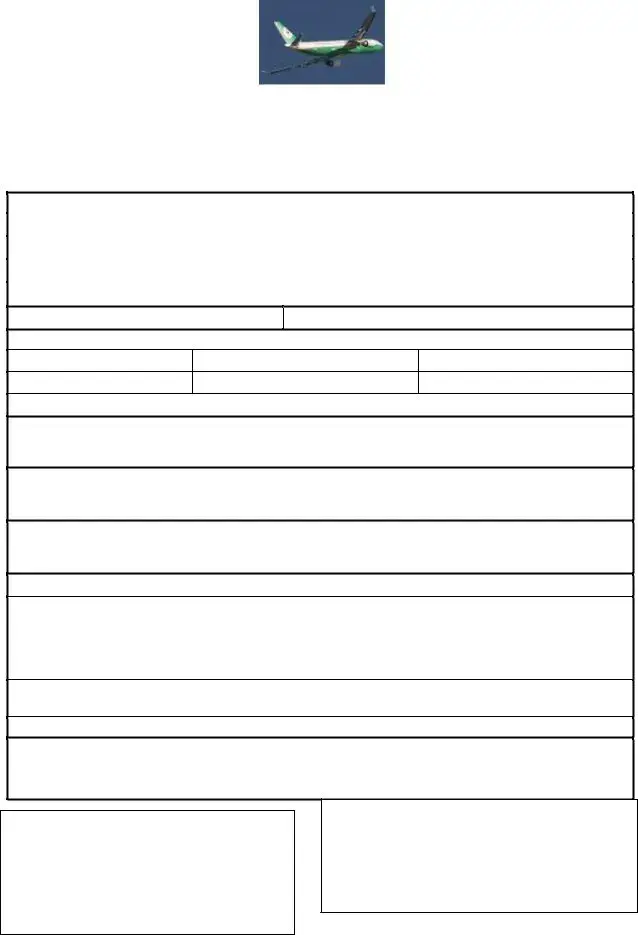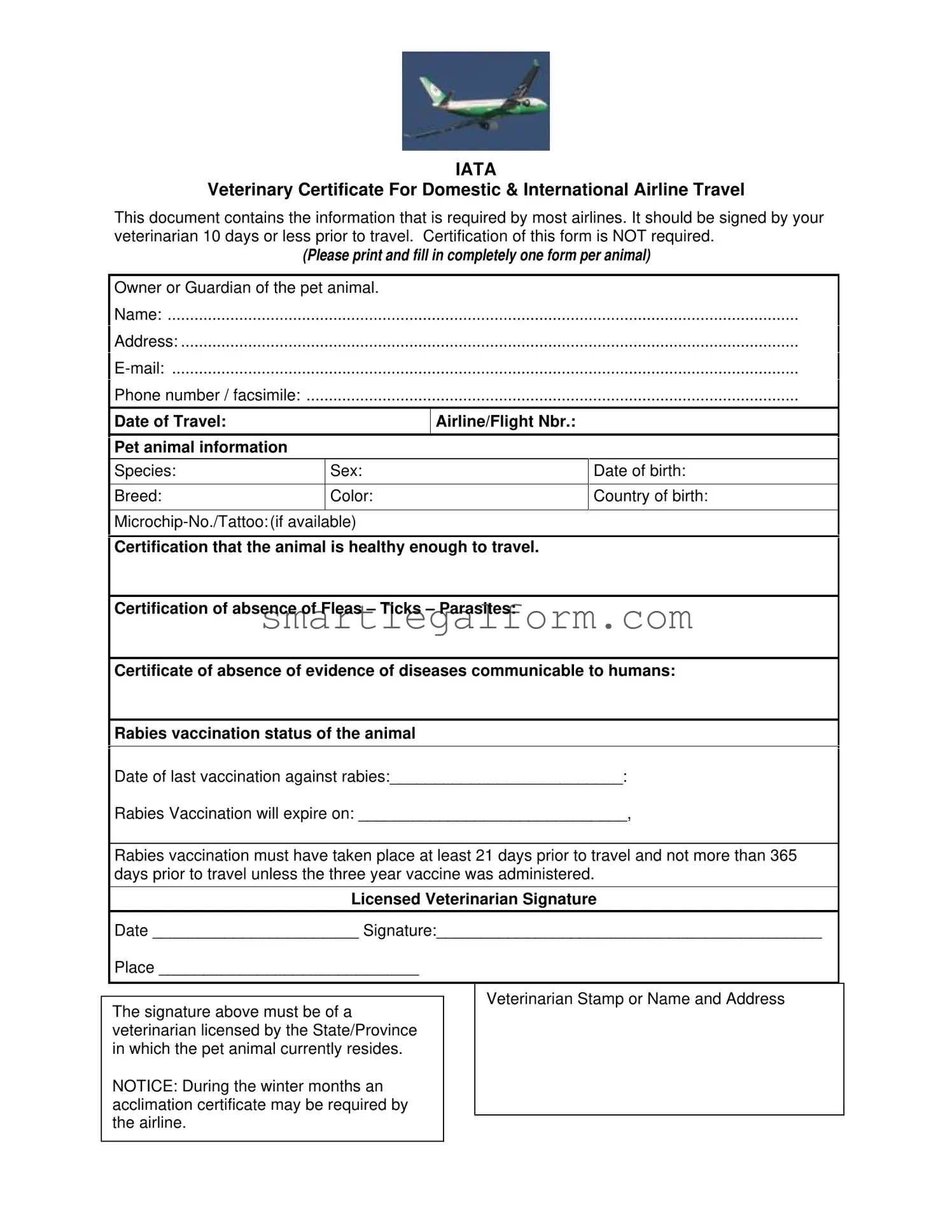Free Veterinary Certificate Travel Form
Form Preview Example

IATA
Veterinary Certificate For Domestic & International Airline Travel
This document contains the information that is required by most airlines. It should be signed by your veterinarian 10 days or less prior to travel. Certification of this form is NOT required.
(Please print and fill in completely one form per animal)
Owner or Guardian of the pet animal.
Name: .............................................................................................................................................
Address: ..........................................................................................................................................
Phone number / facsimile: ..............................................................................................................
Date of Travel:
Pet animal information
Airline/Flight Nbr.:
Species:
Breed:
Sex:
Color:
Date of birth:
Country of birth:
Certification that the animal is healthy enough to travel.
Certification of absence of Fleas – Ticks – Parasites:
Certificate of absence of evidence of diseases communicable to humans:
Rabies vaccination status of the animal
Date of last vaccination against rabies:__________________________:
Rabies Vaccination will expire on: ______________________________,
Rabies vaccination must have taken place at least 21 days prior to travel and not more than 365 days prior to travel unless the three year vaccine was administered.
Licensed Veterinarian Signature
Date _______________________ Signature:___________________________________________
Place _____________________________
Veterinarian Stamp or Name and Address
The signature above must be of a veterinarian licensed by the State/Province in which the pet animal currently resides.
NOTICE: During the winter months an acclimation certificate may be required by the airline.
Common mistakes
Filling out the Veterinary Certificate Travel form can be straightforward, but mistakes can lead to delays or complications during travel. One common mistake is not signing the form. The signature of a licensed veterinarian is essential, and without it, the form is incomplete. Ensure that this step is not overlooked.
Another frequent error involves the timing of the veterinarian's signature. The form must be signed within 10 days of travel. If it is signed too early, it may not be accepted by the airline. Double-check the date before submitting the form.
People often forget to provide complete contact information. The owner or guardian's name, address, email, and phone number should all be filled out clearly. Missing or incorrect details can lead to confusion or delays in processing.
When it comes to the pet's information, accuracy is key. Mistakes in the pet's species, breed, or color can cause problems. Take your time to ensure that all details are correct. This includes the date of birth and country of birth, which should match the pet's records.
Another common mistake is neglecting to include the microchip number or tattoo, if available. This information helps identify the pet and may be required by some airlines. Always check if your pet has a microchip or tattoo and include this information on the form.
Certification of the pet's health is crucial. Some people may overlook the section that certifies the absence of fleas, ticks, and parasites. This certification is important for the well-being of both the pet and other animals during travel.
Rabies vaccination details must be accurate as well. The date of the last vaccination and the expiration date should be clearly stated. It's important to remember that the vaccination must have been administered at least 21 days before travel but not more than 365 days prior unless a three-year vaccine was given.
Lastly, some individuals may forget to check for any additional requirements, such as an acclimation certificate during winter months. Airlines may have specific rules that vary by season. Always confirm with the airline to ensure compliance with their regulations.
Dos and Don'ts
When filling out the Veterinary Certificate Travel form, it is important to follow specific guidelines to ensure a smooth process. Here are some dos and don'ts to consider:
- Do fill out one form per animal to avoid confusion.
- Do ensure the veterinarian signs the form within 10 days of travel.
- Do provide accurate and complete information about the pet, including species, breed, and vaccination status.
- Do check the rabies vaccination dates to confirm compliance with travel requirements.
- Don't leave any sections of the form blank; incomplete forms may cause delays.
- Don't forget to include the veterinarian's stamp or contact information.
- Don't ignore any additional airline requirements, such as an acclimation certificate during winter months.
Other PDF Documents
Navpers 1336 3 - The form signifies a formal appeal for specific Navy entitlements.
Odometer Disclosure Statement California - Cross-outs or alterations in the odometer section invalidate the form.
A Hold Harmless Agreement form, particularly within the context of Texas, represents a legal document designed to release one party from legal and financial responsibility in the event of an accident or other incidents. These agreements are often utilized in situations where risk is inherent, ensuring that individuals or entities can engage in activities or events while clearly understanding the allocation of responsibilities. Notably, this form plays a critical role in mitigating disputes before they arise, fostering a sense of security among participants. For more information, you can visit TopTemplates.info.
Hazmat Bol - The form requires signatures from both the shipper and carrier for accountability.
Similar forms
The Veterinary Certificate Travel form is essential for pet travel, ensuring compliance with airline requirements. Several other documents serve similar purposes in various contexts. Below is a list of these documents and their similarities to the Veterinary Certificate Travel form.
- Health Certificate for Pets: Like the Veterinary Certificate, this document confirms that a pet is healthy enough for travel. It is typically issued by a veterinarian and may also include vaccination records.
- Employment Verification Form: This form is essential for confirming an individual's employment status, validating work history and responsibilities, which can be particularly useful for job seekers and employers alike. More information can be found at documentonline.org/blank-employment-verification/.
- Import Permit: Required for animals entering a new country, this document ensures that the animal meets health standards. It parallels the Veterinary Certificate in that it verifies health status and compliance with local regulations.
- Rabies Vaccination Certificate: This certificate specifically documents a pet's rabies vaccination status. It is a key component of the Veterinary Certificate, as it confirms that the animal has received the necessary vaccinations prior to travel.
- Acclimation Certificate: Particularly relevant during winter months, this document certifies that a pet can safely endure temperature changes during transport. It aligns with the Veterinary Certificate by ensuring the animal's welfare during travel.
- Pet Passport: This international document includes vaccination records and health information. Similar to the Veterinary Certificate, it facilitates the travel process by providing essential health details in one place.
- Travel Authorization Letter: Often required for animals traveling internationally, this letter confirms that the pet is allowed to travel. It serves a similar purpose to the Veterinary Certificate by ensuring compliance with travel regulations.
- Microchip Registration Document: This document verifies that a pet is microchipped, which can be crucial for identification during travel. It complements the Veterinary Certificate by providing additional assurance of the animal's identity and ownership.
